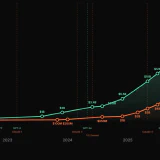Why Execution Eats Ideas For Lunch
Most people tend to overvalue ideas and undervalue execution. In my experience, that holds even for many people in the tech industry. Yet it couldn’t have been further from the truth. Let me tell you about a product that allowed you to easily create and manage your own relational databases together with your team members. It’s not Airtable but their early competitor.

Most people tend to overvalue ideas and undervalue execution. In my experience, that holds even for many people in the tech industry. In general, this couldn’t have been further from the truth.
Now, there are some rare moments in history when getting the right idea at the right time could dramatically affect your outcome. Facebook would have issues coming up either 10 years earlier or later despite their famous ruthless execution. But it should still be true for most cases.
Thomas Edison didn’t develop an idea for an electric light bulb. On the contrary, he entered a race to invent one pretty late in the game. Many people thought of using electricity to produce light, yet nobody figured out how to do this reasonably. There were multiple attempts before him in the 1800s. Edison tried out hundreds and thousands of different combinations of construction and material until he could build a relatively affordable light bulb that could work for many hours.
Around 2014-2015, before I had my stint in venture capital, I worked in comms. We were building lots of spreadsheets that we were effectively using as databases (but with no added functionality or guard rails). Google Sheets were Excel for the web, but they didn’t copy and simplify Microsoft Access. So, I went to look for something that would allow me to create very simple databases. Effectively, a spreadsheet where you can’t just paste arbitrary data in the middle of the sheet.
I found Fieldbook. It was almost exactly what I was looking for. I explored using it for our coverage trackers, media lists, and other use cases. Even back then, it was already miles ahead of Sheets in some specific areas that I needed, but a few things felt a bit suboptimal. I tried looking again and suddenly discovered Airtable. It was an extremely similar product on the surface, but a few key details were different enough to convince me to shift to it.
Even though Day One Ventures didn’t exist yet, we were already doing angel investments. Imagine getting on that opportunity! But back then, I convinced myself that I was a clear outlier and nobody would geek out in databases for some reason. Turned out it was an enormous industry and we got the likes of Notion and Coda. Many industry SaaS solutions are just specialized databases with a couple of custom fields and integrations bolted on. The smaller the industry, the more expensive they often are. So many businesses find it easier to create something on Airtable instead of paying $250 per seat (e.g. Tesla used them to run their inventory).
There wasn’t even a better A/B test for startup outcomes. Airtable was once eyeing $10Bn valuation and downgraded to $5Bn after the pandemic and the financial crisis. Still, it is an extremely impressive result for any business. Fieldbook was only able to raise $2.9M and got acquhired by Flexport. And thankfully, its founder Jason Crawford wrote two good post-mortems (1,2). Companies went after slightly different markets, and Airtable was able to leverage its resources better. But at its core, it was the same idea.
In contrast to the utter simplicity of Slack (chat rooms), Trello (a board of cards) or Dropbox (literally just a folder), Fieldbook required people to learn a new paradigm in order to fulfill the promise that had hooked them in. We worked on this long and hard, and the team did a great job at digging through many layers of incidental complexity, but in the end we hit a bedrock of essential complexity that we didn’t have the resources to drill through.
In contrast, our closest competitor, Airtable, seems to be getting more traction. Early on, their product focus was subtly different, with more emphasis on mobile experience and collaboration features than on data modeling or formulas. These aren’t the features that were most important to the users we talked to, but they’re easier to understand, and I suspect they made both marketing and onboarding easier for Airtable—maybe just enough to make all the difference.
Because it’s the execution that truly matters. If you or I got teleported to 2004 with an idea for Facebook, I doubt we’d be able to create it.




